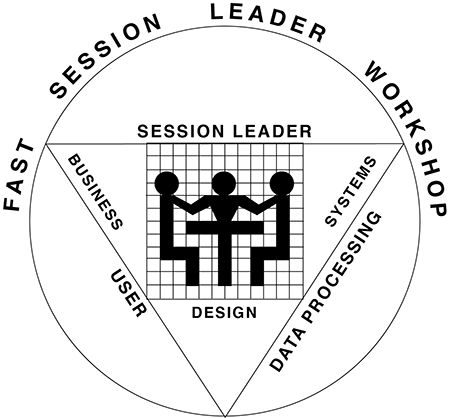September 2003

What is FAST? Back to Basics | Gary Rush Facilitation
We have been in business for over 18 years. After a while, we may take for granted that everyone knows what FAST is and why it's important. In this issue, we define FAST and why you don't want to be SLOW (a Session Leader Out of Work).
The original name was coined for an article I wrote for Computerworld in 1985. In that article, I defined the difference between the various brands of facilitation and identified FAST as a hybrid. Since 1985, FAST has evolved to a completely unique facilitation technique. In 1985, we began by focusing on facilitation relative to IT (information technology - the industry changed from DP to MIS to IS to IT over the past 18 years or so). Over the years, we have broadened our focus to include planning, business engineering, product development, team-building, knowledge management, and others. We have married the concepts of the Process-Consulting style with those of the Relationship-Developing style (see my FAST Newsletter - Facilitation Philosophy) to create a balanced technique allowing the practitioner to use effective facilitation in a wide variety of situations. FAST is our brand of facilitation - and the most complete.
How is it used?
Companies need facilitators. Over the past 15 years, companies have flattened their organizational structure and moved into more of a consensus-building culture. For this to work (and it does work well), companies need facilitation skills in their ranks. Virtually every manager uses some facilitation skills everyday. Having well trained facilitators is the most cost-effective way to leverage the knowledge and skills of the people resources in an organization. It is a foundational skill for Knowledge Management. Organizations use facilitated workshops for:
- Business process re-engineering
- Knowledge management
- Self-directed work groups
- Product development
- Strategic planning
- Internal audits
- Information system projects - especially requirements and design
The uses above are only a small sample. Organizations work by getting their people to come together and accomplish something of value. That's what facilitation is about.
How does Gary Rush Train?
People ask me why I conduct a week long class. There are other places to go to get training in 3 days. Why the additional time? I teach my class in 3 segments:
- Facilitation Skills
- Process Skills
- Practice
Each segment is important and it requires hours of effort by each student.
Facilitation Skills
This segment is the foundation necessary for the facilitator to lead a group of people. I cover general facilitation skills and provide the students with very specific tools to use. They discuss how groups evolve and how to manage groups and conflict.
Process Skills
This segment focuses on how to create an agenda (the method is the same for all agendas). After students understand the concepts, I then describe a variety of "cookbook" agendas. They finish with discussions of documentation, preparation, project planning, logistics, and risk analysis.
Practice
Facilitation is best learned through practice. Each student practices both facilitation and process skills through numerous exercises - including two times facilitating the other students. Each is ready to facilitate upon completion. Every student receives an 800-page reference manual. It requires 8 to 9 hours to read and it covers everything a facilitator could possibly want to know. All of this takes time to learn. The time and money spent on the class is well worth it - payback comes with the first workshop.
What makes FAST different?
FAST is different because:
- I don’t focus on just IT or HR - I cover all of business.
- I teach the concepts - so that you can adapt it when you return to work.
- I make you practice - a lot.
- FAST gives you the materials - a reference manual that shares what was learned over 20 years.
The major difference that I see is philosophy. I believe that people feel better when they learn - they gain confidence and self worth. FAST challenges students - everyone can do great things if given the challenge and the opportunity.
Who to train?
Organizations struggle with whom to send to facilitation training. It varies between a few people to every manager in a department. I tell organizations that facilitation training is highly effective management training (it's really the same skill set). Because of that, managers, analysts, project leaders, senior technical or clerical people, and anyone in a position to get groups to work together benefits from facilitation training. We’ve been in economic turmoil over the past couple of years. Companies have shrunk or reorganized. Organizations need to do more with less. Providing organizations with facilitation skills is the most cost-effective way to leverage their people resources.
Why should YOU be trained
Facilitation skills are THE skill set needed in the 21st Century. This is because of trends in business. Business trends demand facilitation skills to be successful. This means that you, the trained facilitator, become more of a required and desirable resource for your company. Additionally, facilitation skills greatly enhance manager skills. FAST develops LEADERS. This makes you a more effective leader and enables you to perform your job that much better. Leaders are hard to find - anywhere. Companies need leaders more than any other skill and leaders adapt more easily.
You owe it to yourself to develop a set of skills that prepares you for any change in the corporation. Facilitation skills are indispensable to you both in corporate life - and if you find yourself as a newly created entrepreneur.
Summary
Organizations have been through a lot these past couple of years. We now need to mobilize our people and accomplish more than ever before. Organizations that effectively mobilize their people will succeed. People who make this happen will succeed and grow. Facilitators, through facilitated workshops, make this happen. Motivating and helping people come together to do good work is what facilitation is about. ![]()

